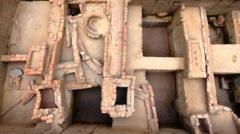The ancient site of Keeladi, located in the southern state of Tamil Nadu, has become a focal point of both archaeological significance and political contention in India. Archaeologists have uncovered evidence of industrial activity and urban settlement dating back 2,500 years among the coconut groves, including terracotta pots, burial urns, and intricate water systems. These findings challenge the dominant narrative that India's civilization primarily originated in the northern regions, emphasizing the importance of southern contributions to early urbanization.
The excavation site has gained attention since its selection for archaeological exploration by Amarnath Ramakrishnan and the Archaeological Survey of India (ASI) in 2013. Over 15,000 artefacts have been discovered, illustrating a sophisticated society once flourished along the banks of the Vaigai River. The state’s archaeological team has presented evidence suggesting a literate society with distinct residential and industrial areas, a pivotal finding in reshaping our understanding of ancient Indian civilization.
With politicians weighing in, Keeladi has morphed into a symbol of pride for those in southern India. The finds support the argument that the Tamil Brahmi script predates the Ashokan Brahmi script, challenging preconceived notions of literacy in the region. However, many experts remain cautious and emphasize the need for more robust evidence to substantiate these claims.
Moreover, the political ramifications of these excavations have led to accusations against the ASI regarding delays and hindrances perceived as efforts to undermine Tamil dignity. Tensions have escalated following the transfer of ASI archaeologist Ramakrishnan, with state officials asserting that there's a concerted effort to suppress findings that celebrate Tamil heritage.
The situation continues to unfold, as debates persist around the findings and their implications. The complexities of Keeladi reveal a deeper connection to India's multifaceted past, underlining how contemporary identities are deeply intertwined with historical narratives. As children explore the exhibits at the Keeladi museum, the significance of these discoveries serves as a reminder of the shared connections across India's diverse history.
The excavation site has gained attention since its selection for archaeological exploration by Amarnath Ramakrishnan and the Archaeological Survey of India (ASI) in 2013. Over 15,000 artefacts have been discovered, illustrating a sophisticated society once flourished along the banks of the Vaigai River. The state’s archaeological team has presented evidence suggesting a literate society with distinct residential and industrial areas, a pivotal finding in reshaping our understanding of ancient Indian civilization.
With politicians weighing in, Keeladi has morphed into a symbol of pride for those in southern India. The finds support the argument that the Tamil Brahmi script predates the Ashokan Brahmi script, challenging preconceived notions of literacy in the region. However, many experts remain cautious and emphasize the need for more robust evidence to substantiate these claims.
Moreover, the political ramifications of these excavations have led to accusations against the ASI regarding delays and hindrances perceived as efforts to undermine Tamil dignity. Tensions have escalated following the transfer of ASI archaeologist Ramakrishnan, with state officials asserting that there's a concerted effort to suppress findings that celebrate Tamil heritage.
The situation continues to unfold, as debates persist around the findings and their implications. The complexities of Keeladi reveal a deeper connection to India's multifaceted past, underlining how contemporary identities are deeply intertwined with historical narratives. As children explore the exhibits at the Keeladi museum, the significance of these discoveries serves as a reminder of the shared connections across India's diverse history.























